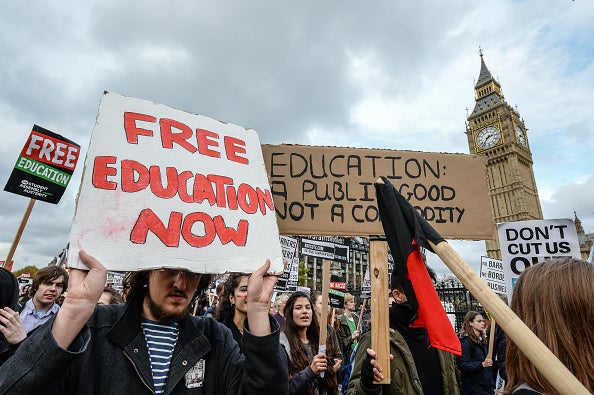National Campaign Against Fees and Cuts urges students to ‘save education’ by demonstrating following George Osborne’s Spending Review
NCAFC says: 'The Government has acted unapologetically - and we must respond in kind'

Your support helps us to tell the story
From reproductive rights to climate change to Big Tech, The Independent is on the ground when the story is developing. Whether it's investigating the financials of Elon Musk's pro-Trump PAC or producing our latest documentary, 'The A Word', which shines a light on the American women fighting for reproductive rights, we know how important it is to parse out the facts from the messaging.
At such a critical moment in US history, we need reporters on the ground. Your donation allows us to keep sending journalists to speak to both sides of the story.
The Independent is trusted by Americans across the entire political spectrum. And unlike many other quality news outlets, we choose not to lock Americans out of our reporting and analysis with paywalls. We believe quality journalism should be available to everyone, paid for by those who can afford it.
Your support makes all the difference.Students at universities across the UK are being urged to take part in a national day of protest today to save higher education “before it’s murdered by the market.”
Led by the National Campaign Against Fees and Cuts (NCAFC), the group already organised a #GrantsNotDebt march through Central London and also took part in another Day of Solidarity event over the Government’s ‘intolerable’ immigration policies.
Now, though, following on from this week’s Spending Review - coupled with the Government’s higher education green paper - the NCAFC described how “these combined reforms will completely devastate publicly funded education.”
The group added: “On the day after the Department of Business Innovation and Skills (BIS) review, we are calling for coordinated action and mobilisation on campuses across the country to spark a broad surge of resistance to these proposals.
“The reforms are currently open to the public for consultation and we want to make sure Jo Johnson hears what we think of them by building on the momentum from our demonstration for ‘Free Education and Living Grants for All’ and save education before it’s murdered by the market.”
Outlining a list of six core demands the NCAFC said the Government must uphold, the group said: “We demand fees are not increased and that the power to raise them is not undemocratically and unaccountably managed by the Secretary of State.
“We demand the market is forced out of our education system. The Teaching Excellence Framework - which will only further harm, pressure, and overburden academics and workers in an already intense climate of precarity - must be scrapped.
“We demand the ‘reforms’ to the education and student support systems be scrapped also.”
As well as these three proposals, the NCAFC added how it will push to ensure private providers are not afforded “easier entry to the “market” - to repress quality and intensify competition in the interests of short-term profit - but that universities are “properly and publicly funded and that education operates as a social good.”
Finally, the group said: “Not only do we want an immediate reversal of the cuts to maintenance provision, we also demand that, in this new ‘funding war’, higher and further education are not pitted against each other, but that there is money for all educational institutions to ensure the flourishing of its students and the welfare of its staff.”
Insisting how “none of the Government’s reforms are concrete,” the NCAFC said: We can defeat this new influx of marketisation. We have an opportunity to influence the conversation around the proposals and to stop this ideological vision before it wreaks irrevocable damage to education.
“The Government has acted unapologetically - and we must respond in kind. We must demand, agitate, and mobilise to defend the very future of education as a collective good.”
Highlighting how students can take part in the demonstration on their campus, the NCAFC said supporters can ensure their vice chancellor speaks out against the green paper by either protesting or occupying their office.
As well as this, the group suggested a ‘teach-in’ whereby students can educate themselves and others on campus about the “dangers of marketisation in higher education” by either taking a room, occupying a public space, or holding large meetings and educational sessions which “end in making creative propaganda and preparing for further action and mobilisation.”
Join our commenting forum
Join thought-provoking conversations, follow other Independent readers and see their replies
Comments